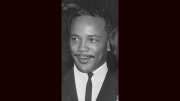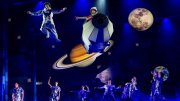LARGELY MISSED in the rush of encomia to beloved musician Quincy Jones, who recently died at the age of 91, were his multiple Harvard connections. He received an honorary doctorate in music in 1997 (“Musician, humanitarian, orchestrator extraordinaire, he bridges worlds and fuses forms in quest of deeper harmonies”), received the Harvard Arts Medal, and was Commencement Class Day speaker in 1997, the same year his daughter Rashida Jones ’97 graduated from the College (she was Class Day speaker in turn, in 2016). That must be one of the few, if only examples of father and daughter receiving Harvard degrees the same year. That May, I hosted an intimate family graduation party at my house for Rashida. Fletcher University Professor Henry Louis Gates Jr. hosted a more formal dinner for both Quincy and Rashida at his house. Quincy subsequently received the W.E.B. Du Bois Medal from the Hutchins Center for African and African American Research in 2000. That same year, Time Warner endowed a chair in the music department named for Quincy, now held by Ingrid Monson, Jones professor of African American music. The Harvard Chan School of Public Health selected Quincy as its first “Mentor of the Year” in 2006.
I am pleased to think that I played a role in the marriage of Harvard and Quincy. During my senior year at the College, I conceived and subsequently ran for its first year out of the Office for the Arts Harvard's “Learning From Performers” (LFP) program. Quincy had agreed to be the first Julian Cannonball Adderley Artist in Residence, named after the famed alto saxophonist who had been on LFP’s advisory committee and, sadly, died before the program commenced. One month before he was scheduled to come, I received a telegram from Quincy’s then-employee, Ed Eckstine, son of famed jazz artist Billy Eckstine, telling me that Quincy would be unable to make the date because his wife, actress Peggy Lipton, was about to give birth to Rashida.
Characteristically generous and responsible, Quincy jumped into the fray to find a fast replacement—and, after I had conversations with such Quincy connections as Roberta Flack and Carmen McRae, secured Cannon’s brother and cornetist Nat Adderley and Los Angeles Times jazz critic Leonard Feather, who served as the first Adderley artists in residence. Our telephone conversations blossomed into a business partnership involving video productions of artists in educational settings and, ultimately, a wonderful friendship. He more than made up for his initial absence by participating multiple times in the LFP program and, to the astonishment of students, made a cameo appearance in my “Public and Private Development” class in Gund Hall.
I received an email the other day from one of the students telling me that his appearance was one of the highlights of her Harvard years. The story goes on for me. I could tell about my two weeks in Japan with Quincy, Michael Jackson, and Michael’s chimp Bubbles on Michael’s first solo international tour following the release of their third album collaboration “Bad,” after the best-selling album of all time “Thriller” and “Off the Wall.” I recall driving Rashida and her mother to Harvard (and Brown) for their New England college tour. But those are stories for another time.









